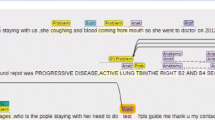Abstract
The paper reports on evaluation of Russian community question answering (CQA) data in health domain. About 1,500 question–answer pairs were manually evaluated by medical professionals, in addition automatic evaluation based on reference disease–medicine pairs was performed. Although the results of the manual and automatic evaluation do not fully match, we find the method still promising and propose several improvements. Automatic processing can be used to dynamically monitor the quality of the CQA content and to compare different data sources. Moreover, the approach can be useful for symptomatic surveillance and health education campaigns.
Access this chapter
Tax calculation will be finalised at checkout
Purchases are for personal use only
Preview
Unable to display preview. Download preview PDF.
Similar content being viewed by others
References
Internet kak istochnik informazii o zdorov’e, medizine i lekarstvennykh preparatakh (Internet as a source of information about health, medicine, and medication). Synovate Comcon Healthcare (April 2014), http://www.comcon-2.ru/download.asp?544
Adamic, L.A., Zhang, J., Bakshy, E., Ackerman, M.S.: Knowledge sharing and yahoo answers: Everyone knows something. In: Proceedings of WWW 2008, pp. 665–674 (2008)
Agichtein, E., Castillo, C., Donato, D., Gionis, A., Mishne, G.: Finding high-quality content in social media. In: Proceedings of WSDM 2008, pp. 183–194 (2008)
Agichtein, E., Liu, Y., Bian, J.: Modeling information-seeker satisfaction in community question answering. ACM Trans. Knowl. Discov. Data 3(2), 10:1–10:27 (2009)
Beloborodov, A., Kuznetsov, A., Braslavski, P.: Characterizing health-related community question answering. In: Serdyukov, P., Braslavski, P., Kuznetsov, S.O., Kamps, J., Rüger, S., Agichtein, E., Segalovich, I., Yilmaz, E. (eds.) ECIR 2013. LNCS, vol. 7814, pp. 680–683. Springer, Heidelberg (2013)
Bhattacharya, S., Tran, H., Srinivasan, P.: Discovering health beliefs in twitter. In: AAAI Fall Symposium on Information Retrieval and Knowledge Discovery in Biomedical Text (2012)
Cartright, M.A., White, R.W., Horvitz, E.: Intentions and attention in exploratory health search. In: Proceedings of SIGIR 2011, pp. 65–74 (2011)
Correa, D., Sureka, A.: Fit or unfit: Analysis and prediction of ‘closed questions’ on stack overflow. In: Proceedings of COSN 2013, pp. 201–212 (2013)
Fox, S., Duggan, M.: Health online 2013 (January 2013), http://www.pewinternet.org/2013/01/15/health-online-2013/
Harper, F.M., Moy, D., Konstan, J.A.: Facts or friends?: Distinguishing informational and conversational questions in social q&a sites. In: Proceedings of CHI 2009, pp. 759–768 (2009)
Kim, S., Pinkerton, T., Ganesh, N.: Assessment of h1n1 questions and answers posted on the web. American Journal of Infection Control 40(3), 211–217 (2012)
Lampos, V., De Bie, T., Cristianini, N.: Flu Detector - Tracking Epidemics on Twitter. In: Balcázar, J.L., Bonchi, F., Gionis, A., Sebag, M. (eds.) ECML PKDD 2010, Part III. LNCS, vol. 6323, pp. 599–602. Springer, Heidelberg (2010)
Lezina, G., Kuznezov, A., Braslavski, P.: Learning to predict closed questions on stack overflow. In: Proceedings of Kazan Federal University (in press, 2014)
Li, B., Jin, T., Lyu, M.R., King, I., Mak, B.: Analyzing and predicting question quality in community question answering services. In: Proceedings of WWW 2012 (Companion volume), pp. 775–782 (2012)
Mendes Rodrigues, E., Milic-Frayling, N.: Socializing or knowledge sharing?: Characterizing social intent in community question answering. In: Proceedings of CIKM 2009, pp. 1127–1136 (2009)
Oh, S., Worrall, A., Yi, Y.J.: Quality evaluation of health answers in yahoo! answers: A comparison between experts and users. In: Proceedings of the American Society for Information Science and Technology, vol. 48, pp. 1–3 (2011)
Paul, M., Dredze, M.: You are what you tweet: Analyzing twitter for public health. In: Proceedings of ICWSM 2011 (2011)
Shah, C., Pomerantz, J.: Evaluating and predicting answer quality in community qa. In: Proceedings of SIGIR 2010, pp. 411–418 (2010)
Sondhi, P., Gupta, M., Zhai, C., Hockenmaier, J.: Shallow information extraction from medical forum data. In: Proceedinhs of COLING 2010 (Posters), pp. 1158–1166 (August 2010)
Wong, W., Thangarajah, J., Padgham, L.: Health conversational system based on contextual matching of community-driven question-answer pairs. In: Proceedings of CIKM 2011, pp. 2577–2580 (2011)
Zhang, Y.: Contextualizing consumer health information searching: An analysis of questions in a social q&a community. In: Proceedings of IHI 2010, pp. 210–219 (2010)
Author information
Authors and Affiliations
Editor information
Editors and Affiliations
Rights and permissions
Copyright information
© 2014 Springer International Publishing Switzerland
About this paper
Cite this paper
Beloborodov, A., Braslavski, P., Driker, M. (2014). Towards Automatic Evaluation of Health-Related CQA Data. In: Kanoulas, E., et al. Information Access Evaluation. Multilinguality, Multimodality, and Interaction. CLEF 2014. Lecture Notes in Computer Science, vol 8685. Springer, Cham. https://doi.org/10.1007/978-3-319-11382-1_2
Download citation
DOI: https://doi.org/10.1007/978-3-319-11382-1_2
Publisher Name: Springer, Cham
Print ISBN: 978-3-319-11381-4
Online ISBN: 978-3-319-11382-1
eBook Packages: Computer ScienceComputer Science (R0)




